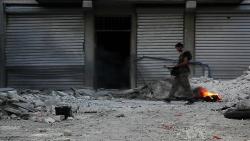 |
 |
BBC: What role should the US play in Syria?

Read the article, also featuring Robert Danin, Aaron David Miller, and Jeffrey White, at BBC News
As civil war in Syria rages, Russian officials say they will send anti-aircraft missiles to the forces backing President Bashar al-Assad, while EU officials have announced they will not renew an arms embargo, a move that could free member states to arm the rebels.
In Washington, meanwhile, US officials say they will not send arms to the rebels.
Yet over time the US officials may also change their minds, particularly if the situation in Syria continues to deteriorate, analysts say.
Elizabeth O'Bagy, Institute for the Study of War:
The US should provide greater support to the Syrian opposition. The goal should be to build a force that is committed to building a non-sectarian, stable state.
The US should look to provide both non-lethal support to civilian groups as well as lethal support to moderate armed forces.
Providing arms through the Supreme Military Command of the Free Syrian Army is the first step in ensuring the army is a professional force that submits to the rule of law.
Providing lethal support to the opposition does entail the risk of unintended consequences.
However, the current policy of inaction carries much more risk.
This policy has not prevented the flow of weapons into Syria nor has it prevented extremists from acquiring arms. Instead, it has prevented more moderate forces from acquiring arms and consolidating their authority while allowing extremist forces to develop their own independent sources of support that are less easily monitored.
Elizabeth O’Bagy is a Senior Research Analyst at the Institute for the Study of War, where she focuses on Syrian politics and security.
© 2013 BBC News